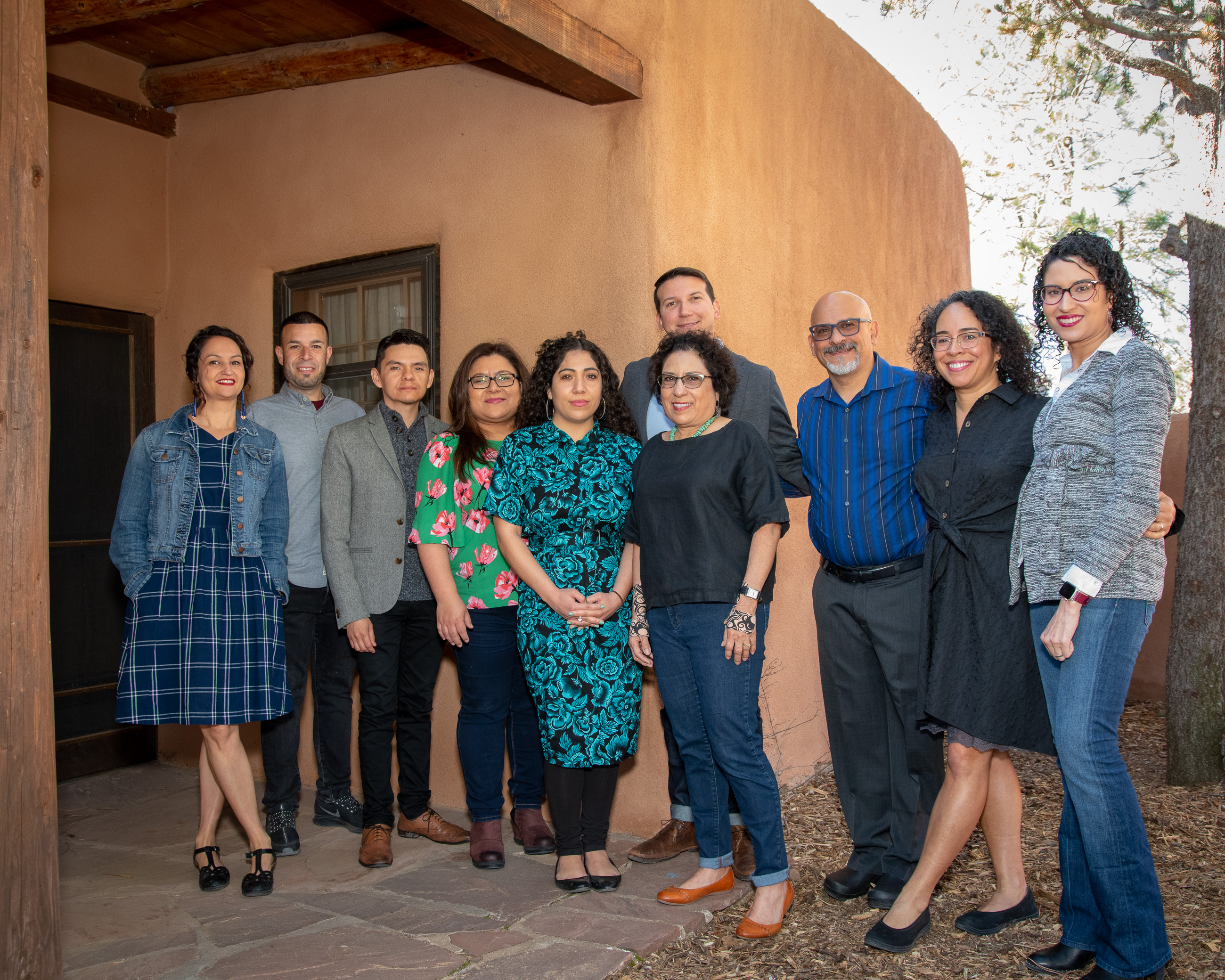
Ethnographies of Contestation and Resilience in Latinx America.
Co-chaired by Alex E. Chavez and Gina M. Pérez
Ethnographies of Contestation and Resilience in Latinx America
The SAR Advanced Seminar “Ethnographies of Contestation and Resilience in Latinx America” brought together ten Latinx anthropologists to share and discuss their ongoing ethnographic work in a range of different Latinx communities. The idea for the seminar emerged in the wake of the 2016 presidential election, when a small group of scholars from the Association of Latina and Latino Anthropologists (ALLA) proposed an executive session panel for the annual meetings of the American Anthropological Association titled “Dissent in the Post-truth Era: Latinx Communities Organize and Resist.” The SAR seminarians hoped to accomplish three goals: First, to highlight the unprecedented series of executive orders issued by the new administration that targeted refugees and immigrants, specifically the Muslim travel ban, and the impacts these would have on the Latinx communities with whom the seminar participants work. Second, while there was a great deal of attention given to protests and to activists’ responses to these new policies, seminar participants were keenly aware that resistance and activism have long histories that are often overlooked or ignored. The goal, therefore, was to bring attention to these histories, as well as to present forms of resistance and organization. Third, the group wanted to bring attention to the specific ways ethnography—careful attention to people’s lived experience that involves listening to and accompanying people in their daily lives—is critical for understanding the complexity of Latinx lives and communities, including the unique and humbling role Latinax ethnographers play in doing this work.
These commitments provided guidance during the week at SAR as participants shared their work, along with their hopes, fears, and frustrations. While the seminar met participants’ expectations of dialogue around the various research projects, the time at SAR also allowed for surprising insights that sharpened participants’ analysis, stretched their theoretical frameworks, and brought them back to foundational texts in anthropology and Latinx Studies. In addition, the seminar affirmed the distinct value and insight of ethnographic engagement for understanding enduring inequality and marginalization, as well as modes of organizing and resistance among the people the scholars work with and learn from in their ethnographic practice. Three of the scholars’ many important conversations and insights include
- their discussion about the meaning and value of radical listening—understanding it as more than just sound and aurality, as more fundamentally a mode of engagement that entails witnessing, hearing, feeling, and attuning to the material and ideological conditions circumscribing the lives of the people they work with;
- their grappling with what it means to do the work that they do, which forced the participants to reckon with colonial histories and violence that still linger and manifest themselves in surprising ways. These troubling and difficult conversations led to a consideration of broader histories of silence and erasure involving Latinx communities and intellectual work and how they might be addressed without replicating hierarchies and exclusion;
- their discussions about everything from trans-Latina sex workers, drug traffickers, reproductive justice activists, and community organizers to faith-based community workers, arts activists, Indigenous leaders, expert legal witnesses and artists, musicians, and homegrown ethnographers, which reminded seminar participants of the importance of careful and humble reflexivity in their ethnographic practice. Talking about themselves as ethnographers was not something that came naturally to all in the group, but as conversation evolved during the week, explorations of how the scholars identified themselves often shaped the questions they asked and the work they have committed to do.
“By the end of the week,” report seminar co-chairs Pérez and Chavez, “we were unanimous in our understanding that being able to share our work with such dedicated and brilliant colleagues had deepened our thinking and sense of the importance of the work we all do. For that we are incredibly grateful and indebted to each other and to SAR for providing this space and time to spend what has proved to be a transformative moment for us in our scholarly work.”
Alex E. Chavez, co-chair
Assistant Professor,Department of Anthropology, University of Notre Dame
Gina M. Pérez, co-chair
Professor, Department of Comparative American Studies, Oberlin College
Ana Aparcio
Associate Professor, Department of Anthropology, Northwestern University
Andrea Bolivar
PhD Candidate, Department of Anthropology, Washington University in St. Louis
Sherina Feliciano-Santos
Assistant Professor, Department of Anthropology, University of South Carolina
Santiago Guerra
Assistant Professor, Department of Southwest Studies, Colorado College
Jonathan Rosa
Assistant Professor, Graduate School of Education, Stanford University
Gilberto Rosas
Associate Professor, Department of Anthropology, University of Illinois at Urbana-Champaign
Aimee Villarreal
Assistant Professor, Department of Mexican American Studies, Our Lady of the Lake University
Patricia Zavella
Professor Emerita, Department of Latin America and Latino Studies, University of California – Santa Cruz
April 10, 2019 @ 12:00 pm – 1:00 pm
Advanced Seminar Presentation: “Refusal, Resistance and Resilience: Latinx Communities Dissent and Organize in Moments of Danger”
Co-chairs: Alex E. Chavez, Assistant Professor, Department of Anthropology, University of Notre Dame and Gina M. Perez, Professor, Department of Comparative American Studies, Oberlin College.
Latinx communities have long histories of organizing and responding to dangerous and uncertain times. The scholars participating in this SAR advanced seminar explore the struggles facing a range of Latinx communities, as well as their varied examples of resistance politics, activism, and organizing. With research based in California, Colorado, New Mexico, Arizona, Chicago, Ohio, and New York, the scholars’ work affirms the need for engaged ethnographic practice across space, time and national borders and raise important questions both about new directions for scholarly work in Latinx Studies and hopeful possibilities for most just futures.
